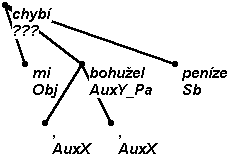The function AuxY_Pa is assigned to particles that relate to the contents of the whole utterance, i.e. the types traditionally called sentential adverbs. As mentioned above, an assignment of an afun with the suffix _Pa is conditioned by a graphic separation from the rest of the sentence (e.g. by commas). Without such a separation, just the function AuxY is assigned, see Parts of multi-word constructions, some particles, decayed parenthesis AuxY
Words that can be assigned afun AuxY_Pa are given by a list. This list equals the list of those words with AuxY that specify a whole utterance, the only diference being a graphic separation.
The list of potential AuxY_Pa: aby, ať, ať už, bohudík, bohužel, jasně, kdyby, kupodivu, možná, naopak, například, nicméně, nuže, opravdu, ostatně, patrně, pravděpodobně, prostě, prý, přece jen, samozřejmě, snad, stejně, tedy, totiž, věru, vlastně, však, zřejmě, že
In the tree structure, a particle with afun AuxZ_Pa is suspended under the predicate of the given sentence (as is the case with AuxY as such). If the parenthesis contains more words belonging together (as e.g. přece jen, ať už - not two independent particles as in například kupodivu for-example to-my-surprise) one part is suspended under the other, while the position of the governor will be occupied by that one that is first in the string. This node gets afun AuxY_Pa, while the second word gets only AuxY.

